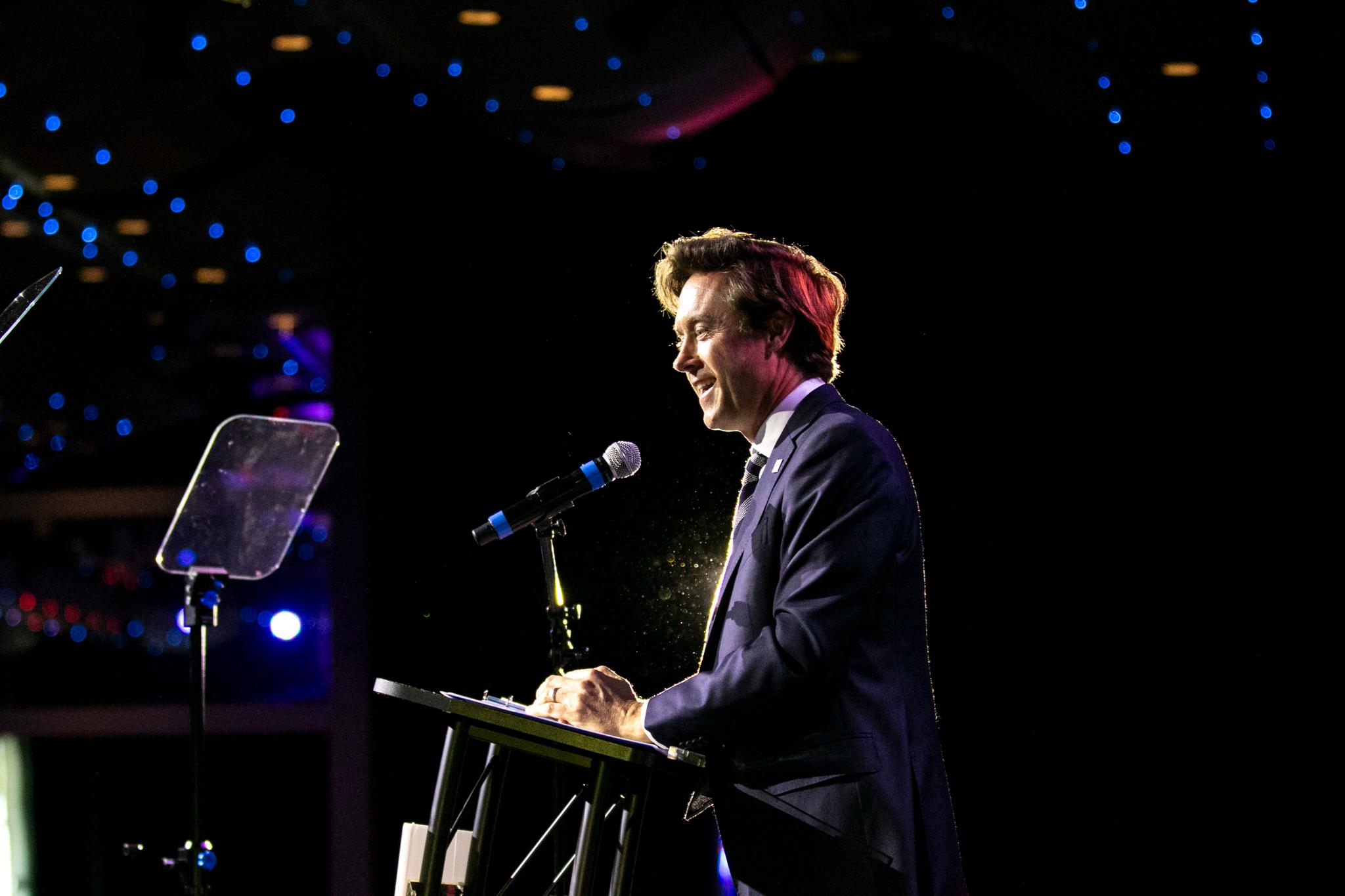A $250 million budget deficit. A shrinking city government. Homelessness and an impossibly high cost of living. Battles with the Trump administration. Struggling businesses. Mass city layoffs. Federal funding cuts.
Mayor Mike Johnston nodded to it all in his 2025 State of the City speech, which marked the halfway point of his first term. But at the same time, Johnston embraced his image as an unflappable optimist.
“How do you build a city that's vibrant, affordable and safe for all of us, so that 150 years from now, our grandkids will look back with pride at how our innovation and ingenuity and yes, inclusion, proudly established a new chapter of Denver as the capital of the New West,” he said on Monday night.
Nearly half of Johnston’s speech focused on Denver’s twin housing and homelessness crises, which have dominated the mayor’s first term. He described the city’s successes in clearing out homeless encampments and creating new support programs, but he also said the city would crack down on “quality of life crimes” such as public drug use and theft, “matching outreach with enforcement.”
“We know the best path forward is not an endless cycle of being on the streets, going to the hospital and landing in jail, but connection to high-quality and long-term support services, and we will find those for the folks that need them and connect them,” Johnston said, speaking before a crowd of hundreds at the Seawall Ballroom at the Denver Performing Arts Complex.
The mayor also laid out a long-term vision for building more housing and infrastructure. That included a promise to convert 4 million square feet of vacant office space into new housing “that is accessible for middle-class Denverites,” part of a larger effort to build 5,000 homes each year. The speech also served as Johnston’s biggest pitch yet for his $935 million bond package proposal, which would pump money into transportation, parks, housing and more.
In the speech, Johnston summoned historical and moral themes, imploring people to replace “learned helplessness” with “learned hopefulness.”
The mayor called for less cynicism and individualism, blasting President Donald Trump’s slashing of social services, trade wars and “political chaos.”
“The insurgent belief is a refusal to believe in anything but yourself. Don't believe in your government or your neighbor or your family. Tear it all down and just look out for yourself. Attack those who try. Mock those in need,” he said.
“That is not only a recipe to prevent us from getting things done,” Johnston continued. “It is a poison to eradicate our very human instinct to turn to each other when times get tough.”

“Outreach with enforcement” to address homelessness
On his first day in office in 2023, Johnston declared a state of emergency over homelessness. He made it a priority to eradicate unsheltered homelessness, bringing thousands of people indoors.
“We did it because we had people dying on the street in record numbers,” he said. “We had thousands of tents blocking access to post offices and churches and hospitals, strangling businesses and frightening residents. We started there because it was a humanitarian crisis threatening the lives of people forced to live on the streets, and it was an economic crisis threatening the city's post-COVID recovery.”
Johnston’s administration moved fast in those first two years, spending more than $150 million to bring people into hotel shelters and tiny homes with the promise of a path to housing.
“We have done something historic,” he told the crowd. “In the last two years, street homelessness in Denver has dropped by 45 percent. That is the largest multi-year decrease in unsheltered homelessness of any city in American history.”
But still, Johnston said that many residents aren’t happy with the scenes on Denver streets. He didn’t say it, but images of people in deep crisis — often yelling, nude or defecating — regularly go viral on social media.

“We all share the belief that our city streets need to be safe for all of us,” he said. “That means an expectation that our residents are following the law and that the law will be enforced. Now that encampments are gone and violent crime is among the lowest this century, we are turning our focus to the quality of life crimes – like theft or public drug use – that impact many of us on a daily basis,” he said.
Johnston said he would continue to push for new treatment options, such as his Roads to Recovery program, but he paired that again with a promise to be both “compassionate and safe.” If people “refuse services and continue to commit crimes,” they will be sentenced and ordered into treatment, the mayor said.
What he did not say during the speech, but acknowledged to Denverite afterward, was that the promise of long-term housing isn’t panning out for everyone in the city’s new shelter effort. Federal vouchers are under threat. And the city has far too few income-restricted units to give everybody a permanent home.
Johnston wants to accelerate housing development.
Construction of housing — both affordable and market-rate — is a priority for the mayor, he said.
He said the city is on track to deliver 12,000 units of income-restricted housing in his first term – a fraction of the 40,000-some units the mayor says Denver needs.
His main approaches include ongoing tax incentives for income-restricted housing, as well as improvements to the permitting system. Johnston recently launched a new permitting team meant to speed up development.
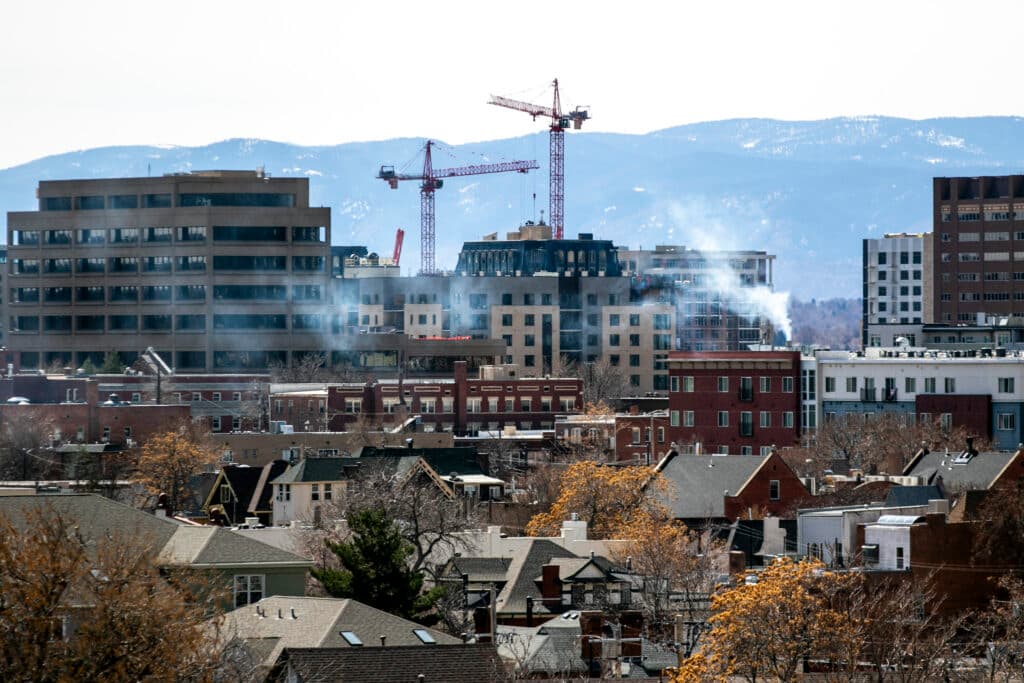
“We took a process that used to take three years and made a promise: Your permit will be done in 180 days’ time in our hand or we'll go refund up to $10,000 of your fees, and that's a commitment,” he said.
Johnston has also launched a new tax rebate for developers to encourage them to invest in income-restricted middle-income housing. It was a replacement idea, in a way, after voters rejected his proposal for an affordable housing sales tax.
However, the mayor didn’t mention one of the biggest issues in the housing debate: land use. He did not talk about a pending city proposal to remove parking requirements for new development, nor did he get into the thorny topic of upzoning for denser development.
Johnston used the speech to market his $935 million Vibrant Denver spending package.
The mayor continues to bet big on the bond package, which would ask voters this November to approve new debt for infrastructure repairs and major new capital projects.
The proposal would pay for dozens of initiatives, from the first phase of the sprawling Park Hill Park to an $89 million rebuild of the Eighth Avenue viaduct.
In the past, bonds have been a pretty good bet for politicians in Denver, but there are signs this one will be more difficult. Denver City Council members have criticized the spending proposals and the process. Meanwhile, some voters say they’re worried about spending big on projects in a time of economic uncertainty — and they rejected Johnston’s affordable housing tax just last year.
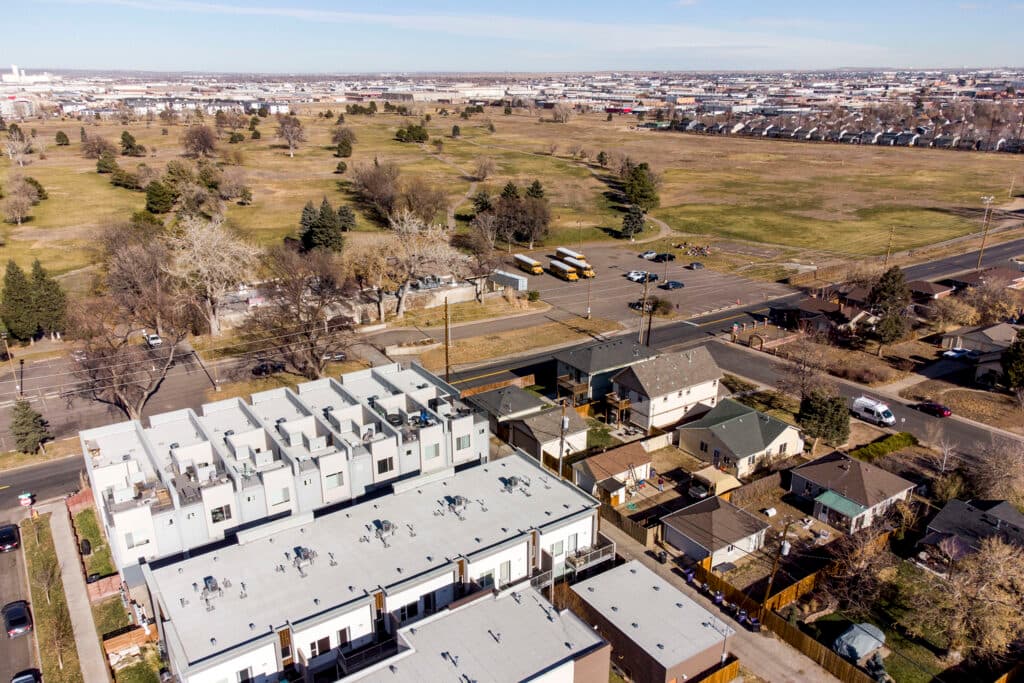
Johnston hasn’t been cowed. In his speech, the mayor appealed to Denver City Council to put the decision in front of voters.
“Some people ask why a city would be making new capital investments in a moment of economic crisis,” he said. “This is the critical moment to leverage public investment to spur economic growth. As these investments create jobs and deliver critical infrastructure that accelerates more private investment, together, we are ensuring our story will be one of a city that grows and grows with purpose.”
The city is still trying to bring downtown back.
Ending downtown encampments was the beginning of Johnston’s effort to revitalize downtown. Now, he said, it’s time to keep investing. The city has largely reopened 16th Street, and voters approved $570 million for downtown projects by the Downtown Development Authority.
With the authority, he plans to create public spaces and parks and bring childcare facilities and art to the city center.
The mayor also expects as many as 50 new businesses to open downtown by the end of the year.
“Expect more concerts, more festivals, more performances, more local retailers, more local restaurants, more wonderful experiences of the best in Denver, only in Denver,” he said.
One of the most ambitious of those downtown ideas: turning empty offices into new housing. The city’s office market is reeling, with downtown vacancy well over 30 percent and some 7 million square feet of space sitting empty.
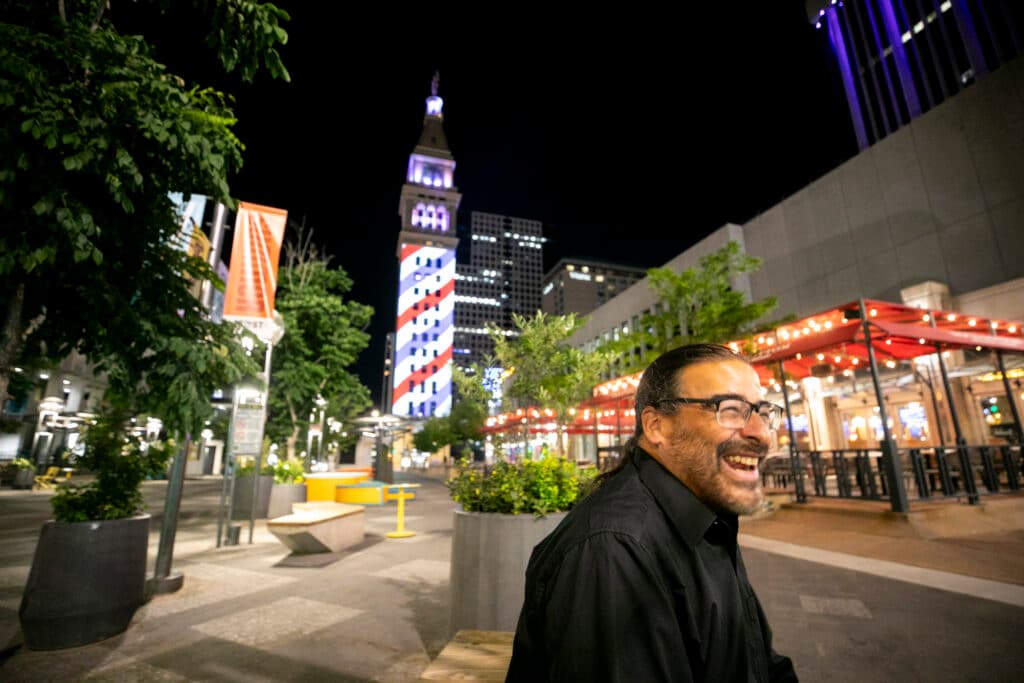
In all, Johnston wants to convert 4 million square feet of commercial space into housing for middle-class Denverites. In theory, that could mean thousands of new condos and apartments. But office-to-residential conversions are notoriously difficult, and the mayor’s vision would be a dramatic acceleration from what the city is seeing today.
Johnston highlighted city successes on crime.
The city is on track to add 300 police officers across 2024 and 2025, he said, and is putting officers in the places with the highest levels of crime.
“Denver has dropped our homicide rate by an astonishing 46 percent,” he said. Axios Denver recently reported that the city’s homicide rate is at one of its lowest levels in decades.
Johnston also said auto theft is down by more than 50 percent and catalytic converter theft by 90 percent.

“In the midst of all that, resident satisfaction with the police is increasing because we have officers out walking beats, building relationships with our neighbors, on trust patrols,” he said.
“And in the midst of turbulent political times, our officers have stood up for freedom of speech and kept the peace at more than 200 demonstrations, both large and small, for these last two years, and for that, they deserve our gratitude.”
Johnston says the city’s problems can be fixed.
“We can prove that our hardest problems are solvable and that we are the ones to solve them,” the mayor said, repeating a slogan he has said for years.
He acknowledged the process is far from complete, and his term has been far from perfect.
“We will never build a city free from human mistakes,” he said. “What we can do is build a city that carries you through crisis and a community, who sees you and cares for you and supports you.”
Success, he warned, “doesn't mean a neighbor struggling with addiction won't relapse, or a gang member won't get pulled back into violence, or we won't lose a favorite restaurant,” he said. “But that is not defeat. That is loss, and loss is a part of being human.”
One major loss is already guaranteed. Johnston must face the city’s fiscal crisis. He has to make $250 million in cuts to the city’s current and upcoming budgets by the end of the year.
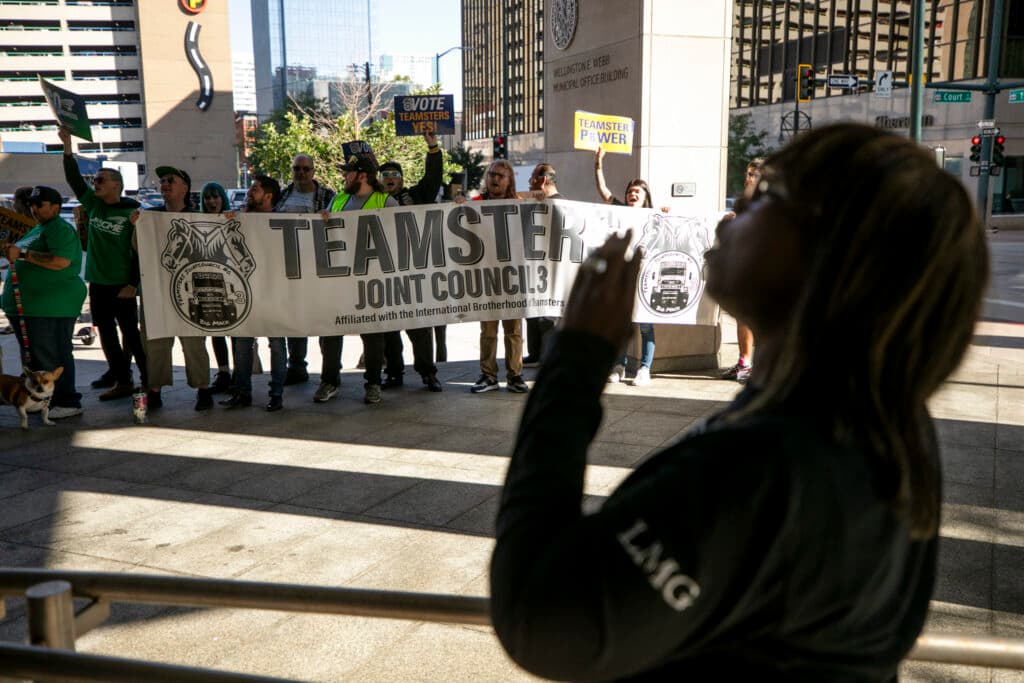
“To meet this moment, we have to find a way to make government work better and cost less,” he said.
He outlined his values as he decides what to cut.
“We will minimize impact on Denver residents,” he said. “We will protect core city services. We will remain focused on our city's top priorities. We will stay focused on equity to protect those Denverites who are most at risk, and we will minimize impact on our committed and selfless city employees.”
As he wrapped up, Johnston returned to the theme of making Denver the capital of the New West, describing it as the “precocious Queen City of the Plains.”
“We don't believe in can't,” he said. “We don't believe in impossible, a place where we turn to each other and not on each other, a place we believe in working to build something bigger than us that includes all of us and lasts longer than any of us, a city that can be a haven for those who live here and an inspiration to those who don't.”
